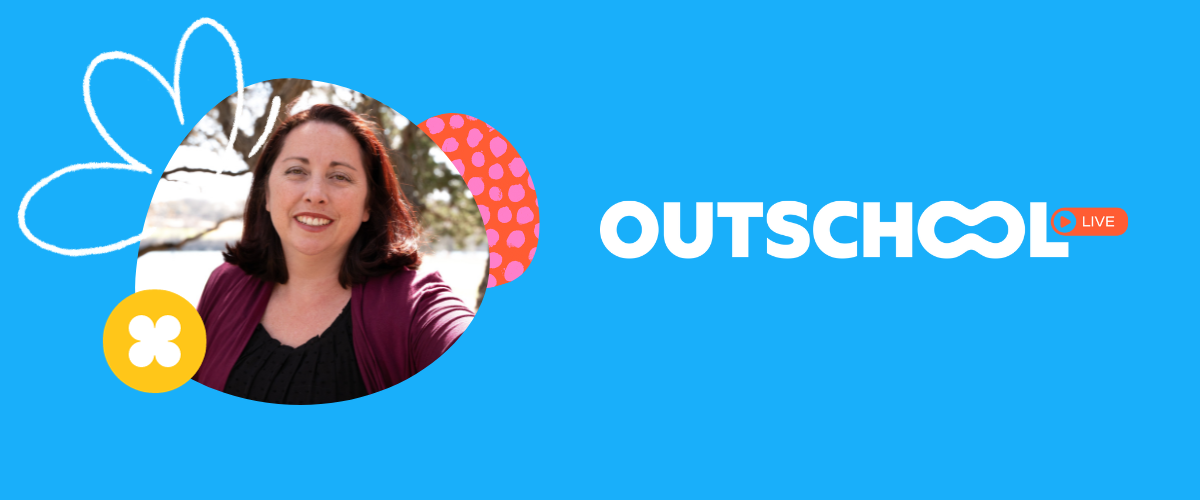Brick-and-mortar schools aren't designed for every type of learner, and succeeding in the rigid classroom environment can be especially tough for neurodivergent kids who want to learn by pursuing their own interests and projects.
That's something homeschool mom and Outschool educator Meagan Tauber knows well. As a parent to two kids who are diagnosed as neurodivergent, she's experienced struggles with public school firsthand.
Meagan recently sat down with our Community Guy, Fernando, to share how she unschooled her neurodivergent entrepreneurs. If you're intrigued by unschooling, or you've ever worried that your kid isn't getting what they need out of a traditional school, you'll be inspired by the awesome accomplishments of Meagan's kids.
Below are our key takeaways from the conversation, but you can also get the full recording here.
Meet Outschool educator & social team star Meagan Tauber
Outschool educator and social team member Meagan Tauber is passionate about inspiring lifelong learning. Meagan has homeschooled her two younger kids since elementary school and is one of Outschool's experienced homeschool experts. She loves teaching interest-based classes that encourage learners to explore and discover the things they enjoy.
Meagan hasn't always homeschooled her kids. She and her husband initially placed them in a highly-rated public school near their home. It didn't take long for the couple to realize that the school wasn't meeting their kids' needs. Her two neurodivergent kids, in particular, struggled with fitting into a system that just wasn't designed for them.
After all, there is no one-size-fits-all approach to education. Some kids thrive in public school settings, where there are set rules and learning expectations. Others do better in homeschool and co-op settings, where rules and expectations can be adjusted to encourage a love of learning.
Meagan shared that the decision to homeschool was a bit scary. She said that starting homeschool often feels like "you're jumping off a cliff and waiting for the parachute to open." The good news is that the fear and apprehension don't last for long.
All families can find education methods that meet their needs—it doesn't matter if you choose a public school or online classes for neurodivergent learners. Meagan told us what really matters is ensuring that your child has the opportunities to learn in a way that's engaging and interesting to them.
Understanding the ins and outs of unschooling
Meagan is proud to be an unschooler now, but it hasn't always been that way. When she and her husband first decided to homeschool, she went to the library and checked out all the books on homeschooling she could find. Many of the books had a quiz to help parents determine their homeschooling style—and Meagan kept getting 'unschooler' as a result.
That bothered Meagan, who considers herself a highly organized person. Today, she says that she was confusing the idea of 'unschooling' with not educating her kids. Of course, she felt resistant to it!
Instead of pursuing the unschooling path, Meagan decided that she would start by doing unit studies with her kids. Her family enjoyed their time with these studies, especially when they were capped by experiences like a field trip to Colonial Williamsburg.
As her kids got older, though, Meagan found that unit studies just weren't working anymore. Her kids were willing to do the units, but they had their own interests as well. That's when Meagan realized it was time to make the leap to unschooling.
It was tough for Meagan to cut ties with traditional schooling methods. She shared that what ultimately gave her the courage to pursue unschooling was having a friend whose unschooled kids were intelligent, well-spoken, and interested in a wide variety of subjects. She also knew that she could count on tutoring for neurodivergent learners when she needed extra support with essential subjects.
You might notice that unschooling is similar to deschooling, which is the process of transitioning from learning at school to learning at home. If you're moving your kids from a traditional school to homeschooling, be sure to give them time to decompress and adjust.
There's no set rule here—some kids take weeks to adjust, while others need a few months to get used to the changes. (Check out tips for homeschooling neurodivergent kids.)
FIRST MONTH FREE!
Get support that meets kids where they are.
Learn moreHow to guide neurodivergent entrepreneurs
For Meagan's family, the unschooling journey meant focusing on her kids' interests. About six years ago, she asked her kids what they were interested in learning about. Although her oldest daughter Astrid continued in public high school, she began pursuing an interest in fiber arts at home. Today, Astrid is a successful young businesswoman and influencer who creates her own beautiful textiles and fiber art projects.
Her son, Aidan, was interested in 3D printing. Meagan enrolled him in 3D printing classes on Outschool. Her younger son, Liam, is fascinated by Battle Bots and engineering. Those might seem like 'just hobbies' to some. But Meagan told us that her youngest actually asked to learn more math because he knew he'd need it to get on Battle Bots.
These victories are what unschooling is all about for Meagan. She shared that teaching neurodivergent kids to be entrepreneurs doesn't have to be difficult. You can support them with online classes in entrepreneurship. Meagan shared that the formula is simple: "Just follow your passion and say yes to opportunities and explore things as you can."
Meagan didn't start homeschooling with the intention of turning her kids into entrepreneurs. It's just something that happened as they pursued their interest. She shared that some of their entrepreneurship was borne out of necessity.
For example, Astrid wanted a $25,000 loom to create textiles for her business. Her parents couldn't fit that kind of expense into their budget, but they could support her as she launched her own business—and Astrid was recently able to order her loom thanks to her own hard work!
Finding interests that inspire life-long learning
Meagan isn't alone in encouraging her kids to pursue their own interests. Many parents, including Outschool's own Kim E., use an eclectic unschooling method to homeschool. You can figure out what your kids are interested in by:
- Asking them what they want to learn about
- Observing what engages them in life and in the classroom
- Introducing them to a wide variety of subjects and ideas
- Supporting them as they develop communication skills and network with others
Handling common unschooling challenges
Unschooling might seem crazy to you, and that's okay. It can be hard to understand if you haven't experienced it or seen the results yourself. Many parents start the transition from traditional school to homeschooling with the help of online homeschool classes. This is a great way to help your child discover their interests. Plus, you can learn about their academic strengths and needs, too.
Of course, the Outschool Neurodiversity Parent Group is a welcoming space where you can share your experience and ask questions. Meagan said that the questions she gets most from parents who are interested in unschooling are:
- Will my kids really learn anything?
- How will unschooling impact their social development?
The answer to the first question is a big yes. When your kids are interested in a subject, they're more likely to pay attention to lessons or do research on their own. If your kids are very young, they'll need some direction instruction in reading and math—but most other subjects can be adapted to an unschooling style.
Meagan shared that the unschooling environment has actually helped her kids grow socially. The public school environment had negatively affected her neurodivergent children, leading them to become withdrawn from their peers. After they switched to homeschooling, they were able to connect with other kids who shared their interests on Outschool.
Her kids have also enjoyed a variety of social and networking opportunities, thanks to their entrepreneurship. Astrid attends art shows, conferences, and industry events where she has an opportunity to develop her communication skills in a real-life work setting.
Supporting neurodivergent kids on Outschool
Meagan shared that the rewards of unschooling have been incredible. They've allowed her to meet one of her key goals for her kids: To make sure that they love what they do as adults. It's really as simple as that!
Outschool is proud to support business leaders like Astrid and young entrepreneurs like Angela who follow their passions and launch their own startup businesses. If you're interested in learning more about entrepreneurship or unschooling, we'd love to talk with you! Join our parent community, or chat with us on our website to get answers to all your unschooling questions.






.svg)
.svg)







